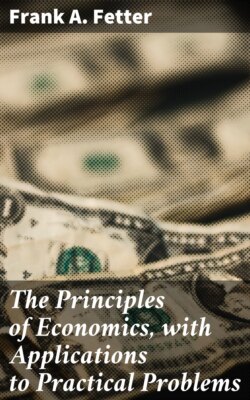Читать книгу The Principles of Economics, with Applications to Practical Problems - Frank A. Fetter - Страница 39
На сайте Литреса книга снята с продажи.
§ I. THE GRADES OF RELATION OF INDIRECT GOODS TO GRATIFICATION
ОглавлениеTechnical rank of agents
1. Goods may be ranked according to their technical relation to wants. The technical rank of goods (sometimes spoken of as the degree of roundaboutness of the process) signifies the number of steps or processes that intervene between the agent used and the desired form. If one wishing the hickory-nut hanging above his head must first pick up a stick to throw at it, the nut is removed one step from desire. But even among savages the processes are much more complicated. The Indian with a crude knife fashions his bow and arrow, fastens the flint and cord which represent still other processes of industry, and shoots the bird which satisfies his hunger. In modern conditions the relations are vastly more complicated; only at the end of a long series do men arrive at the thing which gratifies their wants.
Time relations of goods to wants
2. Goods may be ranked by their relation to wants in time. The relation in respect to time is measured by the period that must elapse before the utility of an agent results in, is converted into, gratification. No agent or influence intervening, a thing may yet be removed a long way from gratification. A tree may not be fitted to bear fruit for ten years to come. Meantime, there are many other possible uses for the tree: it may be used for fuel, or to make a canoe with which to catch fish, or to follow some other indirect method of production. Evidently the technical and time relations of goods are very different. The number of steps has no necessary relation to the time. A number of technical steps may be taken in half an hour, or a process of a single technical step may last a year. In the mechanic arts the technical relations are of primary significance, but in economics the time relations are mainly to be considered.
3. Economic goods may be classified as immediately enjoyable goods and durable agents. Enjoyable goods are goods in a final form, producing gratification or just ready to give gratification the next moment, as the cool draft of air made by a fan on a hot day, the cup of coffee steaming on the table.
Enjoyable goods and durable agents
Many goods of just the same form as the foregoing may not be affording current gratification (except that afforded by thrift and forethought), but are kept because later they will gratify a more intense want or gratify a want better. Apples and potatoes are kept in a cellar so that their use is distributed throughout the winter; cider and wine are kept till they get a quality that appeals more to the palate. Coal, wood, and stocks of goods, are thus kept in the form of enjoyable goods, destined to be physically destroyed when at length they yield a gratification. Evidently they must be storing up meantime a certain additional utility, for otherwise there would be no reason why they should be kept for the future. Such goods as these are sometimes called unripened consumption goods, but until ripened they bear in part the character of durable agents.
Abiding sources of economic enjoyments are called durable agents. The inhabited house is a source of continued gratification in each moment's shelter it affords; but, further, it is the durable source of a series of future uses, as yet unripened. The hammer, the hoe, the tree, the field may all be considered as agents to secure consumption goods. Some of these are but one step removed from direct gratification, as the hoe helping the gardener to get food for his own use. Other agents are bound by many technical links to the ultimate gratification.
Degrees of durableness
4. This classification of goods is abstract, in that it is a classification, not of concrete goods, but of qualities shared in some degree by nearly all goods. Most goods unite in some degree both characters, but in varying measure. This is, therefore, a continuity classification, the varying classes of goods grading from those whose durableness is zero (just at the moment of consumption) to those most durable, which yield an endless series of uses or products. Yet the classification is practical, corresponding as it does with thoughts which men have in the use of goods. By repairs and other methods goods become, and are looked upon as, durable sources of a series of uses.
It is to be noted further that the enjoyable goods pass over into psychic income, that is, they are the stream of objective utilities that is each moment detaching itself as income from the great mass of wealth. The durable goods are those utilities which for the time remain, not yet ripened or ready to be converted into psychic income.
